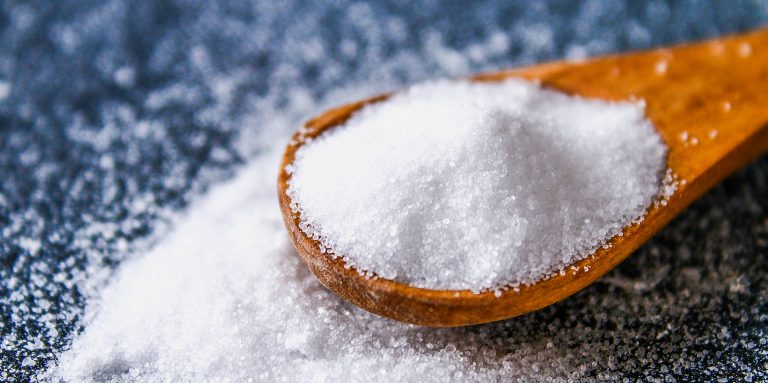
Do we need to be warned about eating salt?
In New York, foods which contain particularly large amounts of salt are to be specially labelled. In principle, this actually isn’t such a bad idea because people still consume too much salt.
New York restaurants which belong to a chain with at least 15 branches will in future have to warn diners about dishes which contain particularly large amounts of salt using a small salt shaker symbol. However, what initially sounds like another spawn of the countless American food warnings isn’t actually that outlandish given the fact that people still generally consume too much salt.
For instance, according to the Federal Food Safety and Veterinary Office (FSVO), the Swiss population consumes about 9 grams per person on average. This figure is higher than the daily intake of 5 grams of salt per person recommended by the World Health Organization.
However, David Fäh, a specialist in preventive medicine from the University of Zurich, doubts whether warning symbols can really help to reduce salt consumption: "The warnings are sensible in principle because they make the general public aware of this issue, but the message mainly gets across to those people who already lead a healthy lifestyle."
The first measures are starting to bear fruit
David Fäh considers the salt strategy which the federal government launched several years ago to be a more sensible approach. It has already enabled initial progress to be made as confirmed by Federal Councillor, Alain Berset, in an interview [in German] with the "Tages-Anzeiger" newspaper in April 2015: "We have succeeded in reducing salt consumption in Switzerland by 10 per cent compared to the long-term average." Among other things, this is because mutually acceptable solutions were agreed, for example with local bakeries which voluntarily reduce the amount of salt in their bread.
However, the parliament refrained from introducing explicit warnings on packaging stating how healthy or unhealthy foods are – also for economic reasons. The majority of parliamentarians argued that listing the ingredients (and usually also where they are sourced) suffices.
What effect does salt have on the human body?
A diet containing a lot of salt increases the risk of cardiovascular illnesses in some people. Consuming lots of salt also increases the risk of getting some forms of cancer. Studies [in German] have, however, also shown that people who consume too little salt are more likely to have strokes or heart attacks. So as is often the case where nutrition is concerned, it is ideal for people to consume it in moderation.
How much salt is in different foods?
We get about 70 to 80 per cent of the salt we consume from processed foods. On a daily basis, this predominantly refers to bread and baked goods, cheese and meat products as well as ready meals in particular.
For example, there is 1 gram of salt:
- in 1 bun
- in 20g dry-cured ham
- in 50g bratwurst
- in 50g boiled ham
- in 70g Gruyère cheese
- in 100ml cream soup
- in 235g Emmentaler cheese
Source: Federal Food Safety and Veterinary Office (FSVO)
- Salt is often added to processed foods. You should therefore preferably eat unprocessed foods like fresh fruit or vegetables and unsalted nuts. Cereal flakes also undergo minimal processing.
- Ask for dishes low in salt when you go out to a restaurant.
- Do not add additional salt. Ban the salt shaker from the dining table. The same goes for liquid seasoning, soy sauce, ketchup and such like.
- Exercise self-restraint where snacks such as salted nuts, crisps and popcorn are concerned. Buy unsalted nuts instead.
- Salt removes water and is therefore also used to preserve food. Where preserved foods are concerned, it is preferable to choose products which do not contain any salt, e.g. frozen vegetables.
- Look at the salt content of the food you eat. The list of ingredients on the product packaging provides this information. It is best to compare items within a product group like bread, cheese or olives.
- Convenience products often contain a lot of salt, even frozen ones (except for fruit and vegetables). It is preferable to do the cooking yourself so that you can control the amount of salt.
- Anyone can add salt. Instead, you should add sophistication to your dishes using fresh herbs and spices as well as lemon juice and from time to time also a splash of wine.
- Potassium in fruit and vegetables helps to balance out the negative effects of sodium in salt. People whose blood pressure increases after salt consumption can benefit from this.
Source: David Fäh
What effect does salt have on body weight?
Salt does not contain any calories. Nevertheless, it can impact on our body weight. It "carries" the flavour and makes people thirsty. They then frequently quench their thirst with calorific drinks. Manufacturers use salt to satisfy consumers and to boost consumption because salt whets the appetite, making us eat more.
Why do we always have to finish the whole bag of crisps?
Once a bag of crisps has been opened, it is incredibly difficult not to polish off the whole lot. Only few people are able to resist this temptation. This "phenomenon of not being able to stop" has a physiological explanation: dried snacks stimulate the production of considerable amounts of saliva. Salt and flavour enhancers actively support this process. The flow of saliva whets the appetite which in turn stimulates the production of saliva. Once the system gets into gear, it is virtually impossible to stop. Quite the contrary: the appetite grows and screams for more.
his article was first published on Beobachter Gesundheit [in German]: Advice, tips on prevention and well-being as well as information on illnesses and symptoms


Newsletter
Find out more about current health issues every month and get all the information you need about our attractive offers from all Helsana Group companies * delivered by e-mail to read whenever it suits you. Our newsletter is free of charge and you can sign up here:
We did not receive your information. Please try again later.
* The Helsana Group comprises Helsana Insurance Company Ltd, Helsana Supplementary Insurances Ltd and Helsana Accidents Ltd.